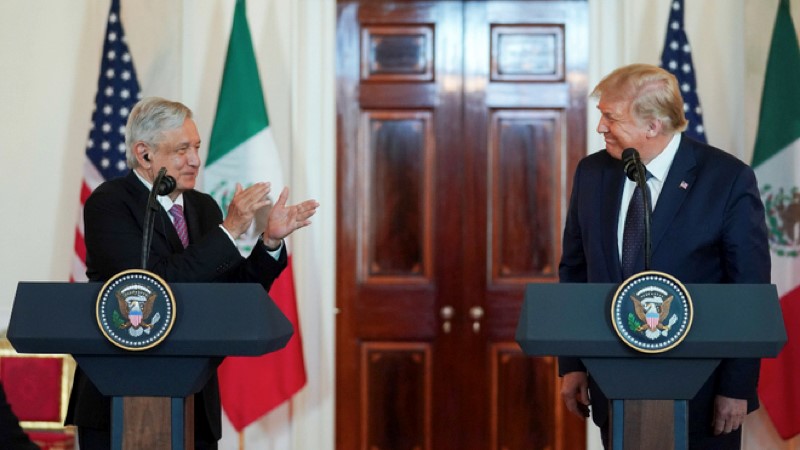In 2017, Andrés Manuel López Obrador, or “AMLO,” launched “Oye, Trump”, a compilation of speeches to the Mexican community in the United States, in which he criticized the president of the neighboring country. He made these speeches in the context of his campaign for the National Palace.
However, in the past two years, the limits of the “progressive” Morena government have been shown, revealing a growing subordination to the demands of the White House, and this is seen in all aspects of their relationship.
The government of López Obrador has strengthened its relationship with one of the most xenophobic and racist presidents of contemporary times, whose humiliating aggressiveness against Mexico has stood out during the last 24 months. Below we develop some key examples.
USMCA, Favoring the Transnationals (Even More)
Mexico’s dependence and subordination to the U.S. is structural and crosses the extensive 3000 kilometer border. This type of relationship was fostered and promoted by the previous PRI (Institutional Revolutionary Party) and PAN (National Action Party) administrations, and found its culmination in the North American Free Trade Agreement (NAFTA), which since 1994 has been the pillar of the economic and political recolonization of Mexico at the hands of the imperialist transnational corporations.
This has led to cross-border productive and commercial integration, under which Mexico has become an export hub for its maquiladoras (factories in Mexico run by a foreign company which exports its products to the home country of that company) and automotive industries. The U.S. has utilized its relationship with Mexico by taking advantage of the cheap labor and its geographic proximity to the U.S. market.
This also marked the incorporation of Mexico into the fundamental value chains of the capitalist world, such as the automotive sector, accelerating exports for decades.
Upon arriving at the White House, Trump — with the policy of “America First” — sought to substantially improve the position of U.S. transnationals and demanded a renegotiation of NAFTA. His “America First” platform was in response to growing nationalist sentiment within the context of commercial confrontations with China
AMLO’s government hinted from the beginning that it would continue on the path of its predecessors. And it was under this government that the new United States–Mexico–Canada Agreement (USMCA) was signed, which again inaugurated new advantages for U.S. capital and continued the subordination of Mexico’s economy to that of its Northern neighbor.
Among the advantages to U.S. imperialism is the 12.5 percent hike in rules of origins requirements in the automotive sector from 62.5 percent NAFTA rate to 75 percent. Other modifications that favor the powerful neighbor to the north involve intellectual and industrial property and digital exchange, as well as opening Mexican territory to labor inspections by the United States.
The Mexican Congress has passed all necessary legislative amendments for USMCA to take effect. The unanimity of the parties — from MORENA to the right-wing opposition — reflected that the native bourgeoisie is betting on the new treaty to confront the economic crisis, as well as to continue enriching itself, as a junior — but very privileged — partner of U.S. transnational corporations.
In a report, AMLO once again reiterated that it is fundamental in the face of the current crisis to promote “foreign investment,” which implies, of course, that the conditions of Mexican workers will be even more precarious and exploitative.
We have seen this in the previous months. Since May 18, before USMCA took effect in July, AMLO’s government has promoted a hasty reopening of the maquiladora and automotive industries. This was directly in response to demands from Washington and U.S. corporations, which put millions of workers and their families at risk. As a result, there was a huge increase in workers deaths from the pandemic, particularly on the border.
Mexico, Donald Trump, and the Border Fence
In 2019, Trump conditioned the USMCA negotiations on AMLO’s cooperation on immigration policies. Trump threatened new taxes against Mexican steel and aluminum exports if AMLO didn’t stem migration from Central America and the Caribbean .
This led to a new immigration agreement, the “Stay in Mexico” program. Consequently, 65,000 migrants have been stranded in unsafe, unsanitary, and precarious conditions at the border, waiting for a response from U.S. authorities.
AMLO has also deployed the National Guard (GN) — which were initially presented as the “peace corps” — to repress and contain migrants. Since then, the GN has acted as the border patrol south of the Rio Bravo, and more than 120,000 Central American migrants have been deported in the last year.
Trump’s immigration demands — which continue the deportation policy pursued by former president Barack Obama — were accompanied by other measures that did not find a receptive response from the Mexican government. For example, the attempts to continue with the construction of the border wall, the threats of cross-border military intervention made at the end of 2019, as well as the deepening of anti-immigrant policy within the United States in the midst of the pandemic.
Since March, the situation of millions of migrants in the U.S.has worsened, as they have had to face job losses and have lacked access to unemployment insurance and health services. Trump also announced the cancellation of the “Dreamers” program, and deported tens of thousands of Mexicans to one of the countries with the highest rate of infection, putting their health at even further risk.
The servility ofAMLO’s government rivals that of its PRI and PAN predecessors. The administration was more worried about looking after its relationship with Trump and looking “the other way” in the face of xenophobic and racist threats than protecting its own working class. Racism and xenophobia, the new anti-immigrant restrictions came to stay.
The Visit
The conclusion of this was AMLO’s visit to Washington in early July. Accompanied by a retinue of Mexico’s most important businessmen, AMLO went even beyond the traditional pleasantries of bourgeois diplomacy: he called the President of the United States a “friend,” and filled his visit with gestures in keeping with the subordinate position he displayed during these last 24 months.
He warmly thanked Trump for his support during the pandemic, and in a recent report even said that he “treated us with respect and most importantly, praised our countrymen who live and work honestly in the United States.” AMLO, let’s not forget, avoided any mention of the issue of migrants during his visit — the very ones Trump is persecuting and deporting — and declined to meet with them.
This visit also took place just as Trump was facing the challenge of large scale anti-racist mobilizations, where millions were questioning police violence and the structural racism that constitutes the imperialist state. In the U.S., African Americans and Latinos face discrimination and violence from police and ICE.
But none of this mattered to López Obrador, who gave a symbolic endorsement to his White House colleague. Under AMLO’s 4T (Fourth Transformation) government, Mexico became an ally of Republican Trump, to the point that the latter now includes images of the visit in his campaign spots.
One of the central objectives of the mentioned visit was to show the importance of the new USMCA for the Mexican government, and to demonstrate in a very illustrative way the political and economic subordination of the Mexican government to the White House. After the trip, Trump, of course, continued with his usual xenophobic and racist rhetoric.
The first two years of the 4T government showed that, in its relationship with the imperialist U.S. governments, there is continuity to previous neoliberal governments. This will continue regardless of who occupies the White House after November’s elections.
In order to truly be on the side of the Mexican working class, it is necessary to have a strong anti-imperialist and internationalist policy which proposes a break with imperialism, non-payment of the foreign debt, and the re-nationalization of all the enterprises given to the transnational corporations, without compensation.
The Mexican working class must seek unity with the powerful multiethnic U.S. proletariat and with the crowds that take to the streets to protest racism and police violence — to jointly advance this struggle, and to defend on both sides of the border full political and civil rights for all migrants in the United States and in Mexico. To repudiate the subordination and surrender to imperialism and the transnational corporations, and to build a powerful unity of the workers and peoples of North America against the capitalists and their governments.











